Editor’s Note: This article first appeared in the Jan 2016 edition of TTAC’s Heroes Against Cancer member newsletter
Oncologists are afraid of estrogen; to them it is to be feared and therefore like a poisonous spider, must be banished, or stomped on. Yet is estrogen really that bad? No! You need estrogen for lowering your risk of heart disease and for developing strong, healthy bones. In fact, estrogen is essential to the health of all parts of your body – from your eyes, to your heart, to your brain and everywhere else.
Are you concerned about estrogen and breast cancer? It is true that estrogen stimulates the growth of cancer cells and thus increases breast cancer risk. But there is much more to the story than that! We need estrogen to live; it is just so terribly misunderstood.
The Dance of Estrogen & Progesterone
Did you know that estrogen and progesterone oppose one another to achieve balance, or “homeostasis”? However, if you have too much estrogen and too little progesterone, the body no longer functions in perfect homeostasis. Progesterone acts to balance estrogen’s actions. While estrogen is associated with breast and other cancers, progesterone has anti-cancer effects.
Estrogen also promotes water retention whereas progesterone is a natural diuretic – which is one of the reasons women who are low in progesterone have greater PMS symptoms. And when there is unopposed estrogen because of a deficiency in progesterone levels, there is an increased risk of developing cancer.
Blaming estrogen is a bit like blaming girls at a dance. If there are ten girls at a party but only five boys, is it the girls’ fault if not all of them have a partner? Yes, one could always invite fewer girls to the party, but wouldn’t it make more sense to invite more boys?
In the same way, if estrogen levels are normal – or lower than normal – does it really make sense to lower progesterone levels? In fact, it may be a better idea to raise progesterone levels to match those of estrogen, so that the normal balance is restored. When the opposing force of progesterone is increased, the potentially toxic effect of estrogen is decreased.
The Science behind Estrogen, Progesterone, and Cancer
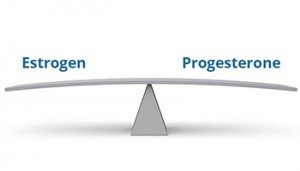
Progesterone and estrogen need to achieve a state of balance. Too much estrogen without sufficient progesterone can increase the risk of cancer
Estrogen has been shown to trigger the activity of, or “turn on” the BCL2 gene, which when expressed at high levels causes cancer cells to grow rapidly and aggressively.
On the other hand, progesterone increases the expression of the so-called “tumor-suppressor” gene P53, which is also known as “the guardian of the genome” because of its ability to prevent mutations in DNA. More P53 causes cancer cell growth to stop, or even die by inducing them to commit suicide (a process known as “apoptosis”).
High levels of the BCL2 gene, therefore, stimulate growth of cancer cells and thus increase the risk of cancer. Progesterone counteracts the actions of the BCL2 gene by stimulating production of the P53 gene, causing cancer cells to die. For instance, progesterone has been shown to induce cell death in T47-D cancer cells (breast cancer cell line for invasive ductal carcinoma/metastasis with hormone receptors) in a laboratory setting.
So if estrogen triggers high BCL2 levels and progesterone stimulates P53 production, why not change the focus to supporting P53 gene activity? Indeed, it seems we can.
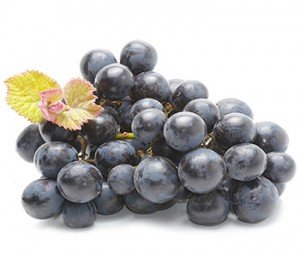
Resveratrol in red grapes and red wine has protective antioxidant properties
The late integrative oncologist Mitchell Gaynor, MD, was famous for his passion for explaining that we can change the way our genes behave by making good dietary choices. According to Dr. Gaynor, resveratrol in red grapes and red wine (organic please) can activate the P53 gene. As you may know, resveratrol belongs to a group of plant compounds called polyphenols, which are believed to have antioxidant properties and protect the body by lowering risk for cancer and heart disease.
Cruciferous vegetables – especially watercress, but also cauliflower, cabbage, garden cress, bok choy, broccoli, and Brussels sprouts (with their high content of the naturally occurring anti-cancer compound PEITC, or phenethylisothyanate) have been shown to support expression of P53. Additionally, herbs such as sage, rosemary, ginger, as well as curcumin (the main active ingredient in the spice turmeric), and ashwagandha (also known as Indian ginseng) have also been found to support P53 activity.
Vitamin C is another promoter of P53, which is one of the reasons intravenous vitamin C therapy is so effective against cancer. On the other hand, processed foods, refined flours, and sugars have all been shown to impair P53.
Recap of P53 Supporters:
- Cruciferous vegetables
- Resveratrol
- Sage, ginger, curcumin (turmeric), and ashwagandha
- Essential fatty acids, for example omega-3 fatty acids
- Licorice
Herbs, including rosemary, thyme, basil, and sage inhibit BCL2 gene activity that stimulates cancer cell growth
- Mistletoe
- Vitamin D
- Selenium
- Vitamin C
Mediterranean herbs such as rosemary, thyme, basil and sage (all rich in ursolic and rosmarinic acid, both believed to have antioxidant properties) have been found to inhibit BCL2 gene activity. For more gene-changing foods and lifestyle habits, read Dr. Gaynor’s book, The Gene Therapy Plan, Taking Control of Your Genetic Destiny with Diet and Lifestyle.
What’s Stealing Our Progesterone?
Progesterone deficiencies and cancer were quite rare before the industrial revolution, when people ate a whole-foods diet devoid of pesticides and added hormones, and before the advent of heavy chemical use and a dramatic increase in air pollution. Why?
Most likely because added hormones, xenoestrogens (see below), synthetic hormones, and pesticide residues have chemical structures similar to estrogen which fool our body, upsetting homeostasis. Compounding the problem is the constant level of stress most of us live with now. No wonder hormone imbalance has become rampant.
Low progesterone levels are also the result of poor adrenal function, impaired thyroid function, as well as poor liver function (hence the sluggish removal of toxins). Important to note is that gluten, commonly found in foods made with wheat, rye, and barley, can also impair the thyroid and adrenal glands by blocking the absorption of vital minerals and nutrients.
Estrogen and Breast Cancer: All Estrogen Is NOT the Same
Estrogen is the general term used for several types of estrogen-like hormones produced by the body, including estriol, estrone, and estradiol. Estriol is a weak estrogen and does not promote cancer formation. Estriol may actually be cancer protective as it balances the pro-cancer effects of estrone and estradiol. Estrone is stronger, while estradiol is the strongest and is unfortunately the most predominant of naturally occurring estrogens.
In pre-menopausal women, estrogen is produced naturally in the ovaries, adrenals, and fat tissues. During menopause, estrogen production declines by over 50 percent and is produced primarily by the adrenals and fat cells. When the body is in hormonal homeostasis, progesterone opposes estrogen, thus keeping estrogen in check. When you have more estrogen than you need in comparison to progesterone, you are considered to be estrogen dominant. Even a woman with low estrogen levels can have estrogen dominance if she is not producing enough progesterone.
Why You Need to Avoid Xenoestrogens
The most harmful estrogens of all are the so-called “xenoestrogens” – which are chemical estrogens that the body does not recognize and which dramatically increase the risk of cancer.
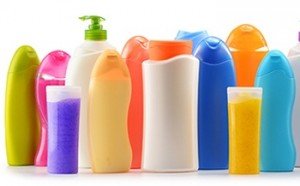
Xenoestrogens, found in some personal care products, can disrupt normal hormone function and increase the risk of cancer
Xenoestrogens are found in personal care products as well as in plastic containers and water bottles. They are harmful because they are endocrine disruptors known to alter the normal function of naturally-occurring hormones in the body.
These chemicals have the ability to mimic natural hormones and bind to hormone receptors. When xenoestrogens enter the body, estrogens accumulate, contributing to estrogen dominance.
Unfortunately, xenoestrogens are not biodegradable, so they are stored in our fat cells – and breast tissue is mostly fat cells. While the liver does an amazing job of detoxifying natural estrogen, it cannot possibly be expected to detoxify the daily onslaught of harmful synthetic estrogen-like chemicals sent its way.
Phytoestrogens: The Anti-Estrogen
Phytoestrogens, while lumped together with other estrogens by allopathic medicine, are generally speaking helpful, not harmful.
Phytoestrogens are plant estrogens which can actually act as anti-estrogens by reducing estrogen activity in the body and protecting us from the stronger estrogen (estradiol) our body produces as well as the xenoestrogens found in environmental chemicals. Not only that, they actually contains compounds that have been shown to reduce the growth and spread of cancer cells.
Phytoestrogens such as lignans found in flaxseeds act more like estrogen blockers than like estrogen; they help modulate the production, availability, and actions of hormones.
Managing High Estrogen Levels
For women who have an overabundance of natural estrogen (again, often a result of toxin overload and chronic stress), reducing the levels of an enzyme known as aromatase can be helpful. Aromatase is also known as estrogen synthetase or estrogen synthase – and is an enzyme responsible for the production of estrogens.
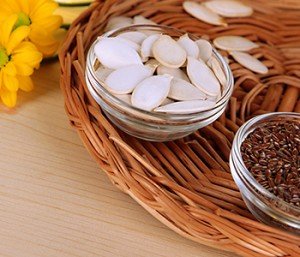
Flaxseeds and pumpkin seeds can help to inhibit aromatase, an estrogen-producing enzyme
However, it is not necessary to rely on pharmaceutical aromatase inhibitors (which cause terrible side effects) to lower aromatase levels. Foods such as button mushrooms, pumpkin seeds, and flaxseeds can effectively help keep things in check.
Additionally, supplements such as DIM (diindolylmethane) may help to protect against breast, uterine, and colorectal cancer. DIM is believed to work by acting like estrogen – although under certain circumstances it might also block the actions of estrogen.
Another supplement, calcium-D-glucarate, is similar to a naturally occurring chemical called glucaric acid found in our bodies, as well as in oranges, apples, Brussels sprouts, broccoli, and cabbage. Calcium D-glucarate can be used to remove cancer-causing agents, toxins, and steroid hormones from the body.
When the liver and colon become sluggish due to low thyroid function, stress, and an overburden of toxins, the body cannot break down and remove excess estrogen adequately from the system. The excess unbalanced estrogen gets stored in the fat cells of breast tissues when it is not properly eliminated. Supporting the liver with detoxifying foods such as cruciferous vegetables, onions, whey powder, and supplements can be very helpful.
Again, reducing estrogen is not always the goal – instead, the goal is to address the cause of high estrogen or hormone imbalance by eliminating xenoestrogens, boosting production of progesterone, reducing stress, and making other appropriate lifestyle changes that can help to create homeostasis and improve health.
Why Can’t I Just Supplement With Progesterone?
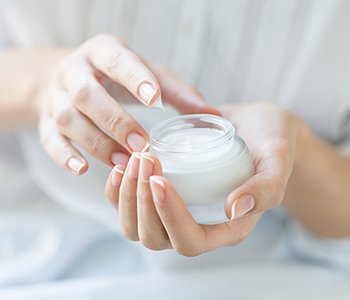
Using progesterone cream may interfere with the body’s ability to make progesterone
Before you reach for supplemental progesterone – know that while natural progesterone has an anticancer effect, synthetic progesterone (found in birth control pills and hormone replacement supplements) does not stimulate activation of the P53 gene. Additionally, as it occupies progesterone receptors, synthetic progesterone prevents natural progesterone from occupying these receptors.
Regarding natural progesterone creams – simply applying these creams and not altering lifestyle habits does not get to the real cause of the problem. Toxins in our food and in our environment and living in a constant state of stress drain the body’s ability to maintain homeostasis!
Also, using progesterone cream may interfere with the body’s ability to make its own progesterone. Still, some women find tremendous relief and resolution of symptoms of imbalance by using these creams. Keep in mind that it is always best to work with a professional healthcare provider to increase progesterone levels naturally, resorting to supplemental use only if necessary until you bring the body back to homeostasis.
9 Lifestyle Choices for Balancing Hormones
Hormone levels go out of balance when we subject our bodies to a lifestyle that includes refined and processed foods, inadequate exercise, poor-quality sleep, and exposure to harmful xenoestrogens.
Here are 9 ways you can support hormone homeostasis:
- Consume phytoestrogens – Phytoestrogens exist within plants as a natural defense against herbivores. Plants secrete these hormones to control the fertility of animals that may eat them to reduce further attacks. They modulate the production, availability, and action of hormones while also slowing down cell division.
Phytoestrogens are a bit tricky to grasp, because the can both mimic estrogen and act as an estrogen antagonist. The most wellknown phytoestrogens are probably the “isoflavones” found in soy. And although soy was initially considered a superfood, the reality is that soy is typically something we should avoid.
But phytoestrogens actually contain compounds that have been shown to reduce the growth and spread of cancer cells, for example…
- A 2009 study of 5,042 breast cancer patients in China showed a significant decrease in death and recurrence in patients on a phytoestrogen rich diet. Phytoestrogens can block cancerpromoting estrogens from attaching to the estrogen receptors on breast cells. They have also been shown to stop tumor growth, prevent metastasis, and shut off new blood vessels in growing tumors. Fermented soy, such as tempeh and miso are preferable to unfermented versions such as tofu as the fermentation process increases free radical scavenging activity. Additionally, fermentation removes the nutrient blocking effect that soy can have – for example, the phytic acid in unfermented soy can block absorption of key minerals such as magnesium and zinc.
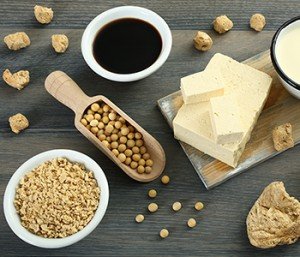
Be very cautious with soy products. At most, limit your consumption to organic fermented soy such as tempeh and miso
Soy in a highly processed form (like soy protein isolate or soy protein concentrate) added to many processed foods should be avoided as they have the greatest ability to block nutrient absorption. Due to the fact that most soy is genetically modified, it is highly recommended to consume only organic, fermented soy.
- Phytoestrogens called lignans in flaxseed modulate the production, availability, and action of hormones. These lignans lower production of estrogen by blocking the aromatase enzyme that makes it (similar to aromatase inhibitors). They also block estrogen receptors similar to Tamoxifen, a medication prescribed to prevent and treat breast cancer.
When lignans are consumed, intestinal bacteria convert them into weak estrogens. These estrogens attach themselves to estrogen receptors, stimulating them weakly and blocking estrogen binding. This prevents the body’s natural estrogens estradiol and estrone from attaching to the estrogen receptors and strongly stimulating them. Similarly, they also block environmental toxins, making breast tissue more resistant to these toxins.
-
Supplementing with Vitamin E can help maintain a healthy balance between progesterone and estradiol
Take a Vitamin E supplement – Vitamin E is crucial to maintaining a healthy balance between progesterone and estradiol. Take a daily mixed tocotrienol/mixed trocopherol supplement containing alpha, beta, gamma, and delta tocopherols (found in formulas extracted from rice bran oil). For example Pure Encapsulations Rice Bran Oil Tocotrienols.
- Supplement with Magnesium – Magnesium is another key nutrient for increasing progesterone levels, as it plays an important role in maintaining a healthy hormonal balance in the body.
- Eat good quality whole foods – A diet rich in whole, primarily plant-based foods will support the adrenal glands and boost every function of the body.
- Physical Activity – Exercise helps reduce stress and positively affects gene expression; additionally, it also helps to balance hormones.
- Clean out your closets and cupboards – Replace synthetic health, home, and beauty products with natural, non-toxic alternatives. A quick visit to the Environmental Working Group website will enable you to evaluate the products you use at home.
- Reduce stress – Stress challenges adrenal function and makes direct physiological changes to DNA, not to mention that it
significantly raises estrogen levels and depletes progesterone. Engage in yoga, prayer, meditation, and other mind-body therapies that release negative emotions and help to relieve past traumas. - Drink clean liquids – Choose filtered water (remove chlorine, fluoride, and other toxins in tap water). Avoid alcohol, but if you drink wine, make it organic – you wouldn’t eat conventional grapes, so don’t drink conventional wine. And, while red wine does prevent breast cancer (resveratrol helps to metabolize estrogen and activates the P53 gene), don’t go overboard. Remember that your liver has to process that alcohol and if you drink too much, it won’t be able to metabolize estrogen efficiently.
- Go with your gut, take a probiotic – Probiotics support gut bacteria and improve digestion, helping to prevent constipation. This is important because when the stool remains in the bowel for extended periods of time, excess estrogen is re-absorbed and recirculated. Plus, immune function depends on healthy gut bacteria, which affects cancer genes too!
Once again it is important to remember that cancer is primarily an environmental disease. It comes about over time through the individual’s experiences, habits, and dietary choices. And yet, looked at another way, cancer is certainly a genetic disease in the sense that it is those same experiences, habits, and dietary choices that affect the way our genes behave. Everything you eat, drink, and think influences the likelihood of the “dis-ease” known as cancer.
So, before you allow your oncologist to bully you into taking Tamoxifen or aromatase inhibitors, ask them how the recommended treatment will correct hormone imbalances, improve your health, or change the cancer environment. If they can’t answer your questions, find a qualified healthcare provider who can.
Would you like to know ALL the ways to prevent, treat, and beat cancer? If so, you’ll love what you discover here.
Article Summary
Estrogen is a very misunderstood hormone. While it’s true that estrogen stimulates the growth of cancer cells and thus increases breast cancer risk, it is also essential to the health of all parts of your body – from your eyes, to your heart, to your brain and everywhere else.
Progesterone acts to balance estrogen’s actions in the body. While estrogen is associated with breast and other cancers, progesterone has anti-cancer effects.
Progesterone increases the expression of the “tumor-suppressor” gene P53 which causes cancer cell growth to stop, or even induces cancer cells to die by committing cell “suicide.” Consuming the following plants and nutrients helps support P53 in the body:
- Cruciferous vegetables
- Resveratrol
- Sage, ginger, curcumin (turmeric), and ashwagandha
- Essential fatty acids, for example omega-3 fatty acids
- Licorice
- Mistletoe
- Vitamin D
- Selenium
- Vitamin C
Estrogen is the general term used for several types of estrogen-like hormones produced by the body including estriol, estrone, and estradiol. Estriol is a weak estrogen and does not promote cancer formation. Estrone is stronger, while estradiol is the strongest.
The most harmful estrogens of all are “xenoestrogens” – chemical estrogens that the body does not recognize and which dramatically increase the risk of cancer. Xenoestrogens are found in personal care products, plastic containers, and water bottles.
Phytoestrogens are plant estrogens which act more like estrogen blockers than like estrogen. They help modulate the production, availability, and actions of hormones and even contain compounds that help reduce the growth and spread of cancer cells.
Here are 9 ways to support hormone homeostasis (balance) in your body:
- Consume phytoestrogens
- Take a vitamin E supplement
- Supplement with magnesium
- Eat good quality whole foods
- Regular physical activity
- Get rid of toxic personal care and cleaning products
- Reduce stress
- Drink “clean” liquids (i.e. filtered water)
- Take a probiotic










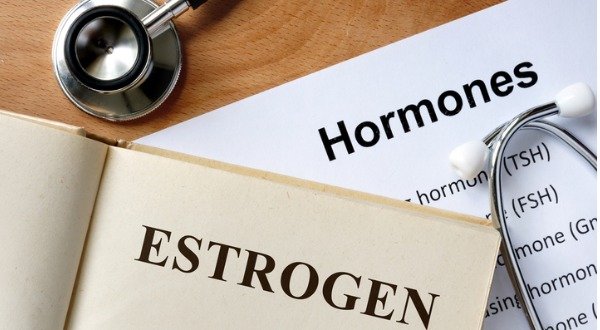
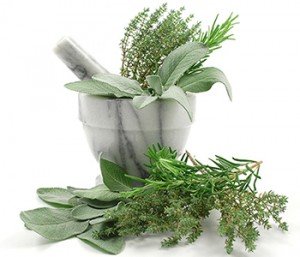
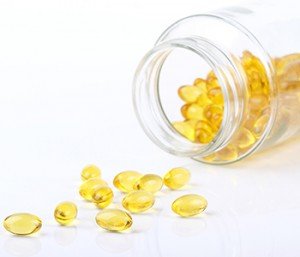








Excellent article .Benefited it . A powerful herb which will naturally boost testosterone levels by keeping the testosterone molecule free from a carrier protein (SHBG)
I have breast cancer. My oncologist wants to put me on aramatase to keep my Estrogen low. I was wondering if it would be ok to get a testosterone pellet for increase muscles, libido, and memory?
If your tumor is/was PR positive you should watch progesterone as well. I am a survivor whose tumor was estrogen receptor (ER) positive and progesterone receptor (PR) PR positive and was advised against both estrogen and progesterone suppliments as they were causing my tumors to grow. I take tamoxifen currently.
Please read the book Estrogen Matters written by an Oncologist! Best book on the topic.
This article was very helpful. I had a BC dx in December 2017, lumpectomy February, 2018, radiation 4/9-5/18/18…no chemo. Went on aromatase inhibitor (anastrozole) in June, was given an Rx for the horrible hot flashes in July (venlafaxine) which worked for maybe 4-6 weeks. I finally decided that the awful side effects from the anastrozole were not worth the risks of the possible return of the BC, so I went off all meds 2 weeks ago. (approximately 5 mos of that medication…I can’t imagine having to take it for 5 years!) Aside from the “withdrawal” of the venlafaxine, my bone, joint, muscle pain has subsided quite a bit. I’m still overly tired, but that’s mainly due to the fact that I cannot get a good nights sleep because of the hot flashes. I am still searching for something that will work for me for the hot flashes, but I have gotten some GREAT information from this article. Thank you!
Have you tried magnesium as well as melatonin before bed? I noticed an improvement in my sleep. I also put on healing music or Louise Hay along with a diffuser filled with lavender, frankincense, and tea tree oil.
your story sounds a lot like mine. Luckily, I was able to meet with a retired surgeon who has studied the effects of aromatase inhibitors and is presently meeting with breast cancer patients who have just finished their treatment. I was convinced that I did not want to take anastrozole or tamoxifen due to the side effects and serious issues that can and do occur. Since I already have arthritis and joint pain, and at 72 years old am looking for a quality of life, I decided against taking the endocrine therapy and completely changed my lifestyle. I eat primarily plant based foods, do regular exercise as well as spiritual exercise. I believe that my cancer will not return and that if it does it will be many years from now. Am so grateful I made this decision.
Are you promoting drinking wine for the Resveritrol ? The acetaldehyde in alcohol causes cancer -Resveritrol should be taken as a supplement !! All California wine in carcinogenic as they use Round Up in the vin yards !!!!!
Iodine is something we forget about ….in its involvement with fibrocystic breasts and cancer.
Since I’ve been taking iodine ….my cysts have stopped.
Lots of research out there on that…..Dr. David Brownstein, has interesting read.
Thank you for sharing your personal experience with iodine with us Ellie! We are glad to hear that it has helped your cysts stop. Best wishes!
Excellent article! As a wellness and preventive health MD, I also teach hormone balance to my patients, both female and male and to women of all ages. Realize that hormone imbalance occurs in women,of all ages but it most common in the adolescent (beginning of menstrual career) and in women in their 40’s or toward the end of their menstrual career. But female hormone balance isn’t just about Estradiol and Progesterone; it’s also about balancing male with female and about balancing adrenals with thyroid with fasting sugar and insulin; in fact many experts feels that Vitamin D is the 5th hormone group along with the other 4 listed above, The importance of balancing all of these groups is paramount to your health.
Dr. Victoria J. Mondloch, Waukesha, Wi
My name is Hilda, been experiencing waist pain for about a year. Sometimes the pain radiates to my back. I have great appetite and my weight is increasing but within normal range. I was taking pain killers but stopped some months ago because I do not want to be addicted . I noticed that when I take lemon juice and ginger, the pain subsides but when I don’t take it I experience it again. Ultrasound revealed a cyst in my left ovary which about 2cm .My Doctor said it’s insignificant. I have done other investigations but all negative. Currently I started taking flaxseed capsule, turmeric tablet,
Ginger capsule and lemon juice twice daily. Please I want to know if the combination is good and if there is something else I should take. I also want to know if there’s a laboratory investigation that detects cancer in body. Thanks
Jeezo i am totally bamboozled on what to take for estrogen positive grade 1 bc. I had my tumour removed ( surrounding tissue was clear ) But microscopic C cells found in 1 lymph node. Take Letrozole for 5 years which is a horrific medication along with Radiotherapy ( Just as a precaution ) ? I have Oncologist tomorrow to tell her i am refusing both the medication and Radiotherapy ( Just as a precaution ) as surely there must be another way of lowering estrogen levels naturally!! But so so many conflicting pages advising on what to take i just do not know where to run anymore as not one page or site agrees on the same vitamins/ minerals etc to keep the immune system in tip top condition . Re diet i can cope with as to what i should eat and what to avoid. Can anyone help re what’s the right way to keep estrogen levels as low as possible’ and what vitamins and supplements to take for the immune system . Thanking everybody x
Our hearts go out to you! Unfortunately, we are unable to give any kind of medical advice. The best advice we can give you is to consult with one of the doctors we interviewed in the Global series. We’ve created a page with the experts’ contact info as it was available to us.
Here’s the link to the actual webpage:
http://thetruthaboutcancer.com/experts-info-sheet/
We do have one more resource you may be interested in. During our Live Event 2017 series, Dr. Patrick Quillin suggested contacting The Institute of Functional Medicine to locate a practitioner in your area. If you are interested, here is the link to search for a Functional Medicine Practitioner in your area: https://www.ifm.org/find-a-practitioner/
Sending you thoughts and prayers for hope and healing!
Thank you. I’ve just saw your reply! I will go check out these links and i wish everyone on here good health and sending healings to you all xxx
Sounds like we’re in the boat Caroline.
Recent lumpectomy Dec 2018, radiation scheduled with the new GammaPod in Baltimore but those hormone pills…ugh…reviews are just horrible! I have my prescription filled but haven’t taken one and likly not going to take them. I’m searching for a something else, anything else I can do to avoid those pills. I want to live but with a quality of life, I just don’t want to exist from day to day in pain.
I am taking Essiac tea, Budwig diet (flax and cottage cheese), broccoli/radish sprouts along with turmeric, CBD oil and Noni juice. Now I’m looking for something to help with the estrogen issues. I wish you luck, and may we find what we’re looking for in this sea of information.
Little frustrated with my oncologist, had a lumpectomy for cancer 1a and 25 founds of rads. Not on an estrogen blocker, I have no ovaries. I am TOLD estrogen can be made in your adrenal glands and in fat. I have been so constipated that I cannot go, I drink water, I eat fiber, I take coconut oil, I do all of it, and i also have UC which in my case has been constipating. I keep begging her to test my estrogen levels and she doesn’t. Is it me or can they be over prescribing rather than try and come to better conclusion. Metamucil all of it, oh my GOD. Frustrated, oh and I have no thyroid, due to cancer, so THAT may be the problem but they only look at numbers not us as a whole.
You may want to try a Magnesium supplement. Our family uses CALM by Natural Vitality. Or CountryLife Magnesium Caps. They are available in regular healthy grocery stores or online and have been great in relieving constipation and in restoring regular bowel movements for us. We use them regularly because they are not laxatives, but take care of constipation gently and without cramping. Wishing you all the best.
I am so confused. I just got a bottle of DIM because I have almost every symptom of estrogen dominance. I had a full hysterectomy 2 yrs ago. I have been taking 1mg Estradiol for about 6 yrs. Ive had the symptoms for about 3 years. I thought the hysterectomy would help but it only made it worse. My question is, are you supposed to discontinue estradiol before taking DIM? or do I take DIM and estradiol at the same time? My ob/gyn doesn’t believe in supplements and won’t even address my question. He did test my hormones and said they looked fine for someone my age, 52, and just told me to continue with the estradiol. Please help!!
This may or may not be allowed, but you should investigate taking the Triplex combo from Plexus. All of these plant-based products target gut health and therefore affect hormonal issues. Good testimonies all around!
On the subject of soy being a food to avoid, I encourage everyone here (TTAC group included!) to go watch Chris Wark’s interview (Chrisbeatcner.com) with Dr. Kristi Funk, a board-certified surgical breast specialist and an expert in minimally-invasive diagnostic and treatment methods for all types of breast disease.
https://www.chrisbeatcancer.com/dr-kristi-funk-author-of-breasts-the-owners-manual/
Something to think about! God bless! <3
Meant to add- she addresses the subject of soy and why it is in fact necessary for breast health in both breast cancer patients and those wanting to prevent it around mark 35:14.
I was diagnosed in 2017 with Er+ and PR – Hers 2+.
I recently was told by an oncologist that I was very close to Triple negative because my positive was only 2%. With that said meaning my body is not producing hormones. How do I produce my own hormones or much more balance them out? I am 59 years.
Hi Rubie –
Thanks for reaching out to us.
Unfortunately, we are unable to give any kind of medical advice. The best advice we can give you is to consult with one of the doctors we interviewed in the Global series.
Please note that we are not able to select an expert for you.
We’ve created a page with the experts’ contact info as it was available to us.
Here’s the link to the actual webpage:
http://thetruthaboutcancer.com/experts-info-sheet/
We do have one more resource you may be interested in. During our Live Event 2017 series, Dr. Patrick Quillin suggested contacting The Institute of Functional Medicine to locate a practitioner in your area.
If you are interested, here is the link to search for a Functional Medicine Practitioner in your area: https://www.ifm.org/find-a-practitioner/
It would be best if you reached out to one of these professionals so they can best guide you based on your individual body type and health conditions.
Hope this is helpful to you!
Wishing you blessings and love!
Thanks for all you do!!! Buzzbee.
Having too much estrogen is not good which can cause all kinds of estrogen related cancers. Does Estrosmart lower your risk of breast cancer and ovarian cancer?
I have had stage 3 breast cancer – estrogen and progesterone receptor positive and subscribed to much of the thinking in the above article. My original cancer was diagnosed in 2017 and was I took Tamoxifen after a mastectomy. I had a recurrence one and a half years later due margins not being clear. This was followed by a second operation for the removal of my pec major. I subsequently did radiotherapy and went onto Aromasin an AI. I came across the article below and much of what I believe is strongly contradicted. Here is the link for the article: https://www.townsendletter.com/article/445-6-estrogen-vindication-pt-1-whi/
Estrogen Vindication, Part 1: Estrogen and the WHI
By Devaki Lindsey Berkson, DC
Witnessing my wife’s battle with breast cancer was incredibly painful. Traditional treatments weren’t providing relief, so I sought alternative solutions. I’m immensely grateful to Dr. Kokobi for his herbal treatment, which brought about remarkable improvements in her condition. My wife and I are deeply thankful for his care. I wholeheartedly recommend his treatment to anyone facing this challenging illness. You can reach him on website: kokobiherbalremedycentre.weebly.com
Witnessing my wife’s battle with breast cancer was incredibly painful. Traditional treatments weren’t providing relief, so I sought alternative solutions. I’m immensely grateful to Dr. Kokobi for his herbal treatment, which brought about remarkable improvements in her condition. My wife and I are deeply thankful for his care. I wholeheartedly recommend his treatment to anyone facing this challenging illness. You can reach him on website: https://kokobiherbalremedycentre.weebly.com